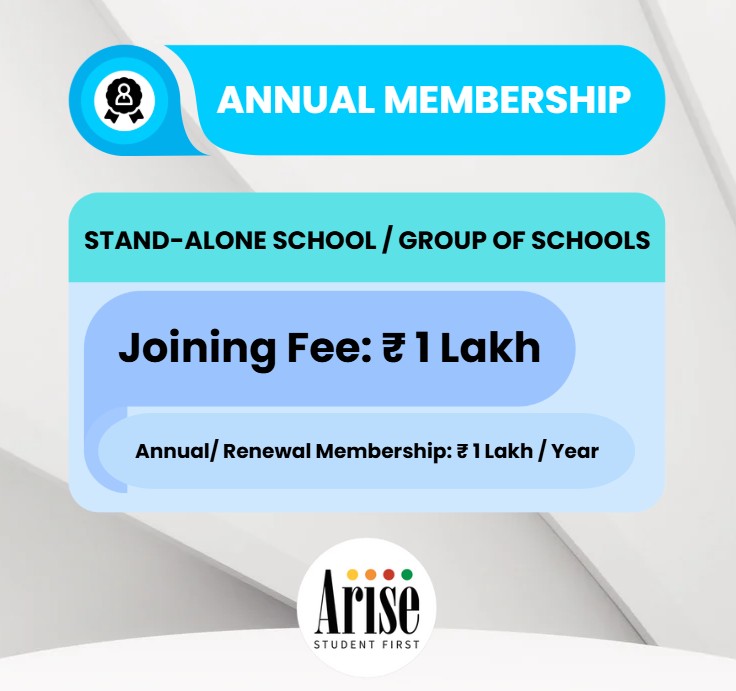Subscribe:
Stay up to date with all upcoming ARISE programs, conferences, awards, and initiatives through our public calendar.
Stay up to date with all upcoming ARISE programs, conferences, awards, and initiatives through our public calendar.

ARISE initiatives define the core pillars of our work, driving transformative change in the K-12 education landscape. Through dedicated policy advocacy, we work to shape policies that align with the demands of 21st-century readiness, preparing students for future challenges and opportunities. Our ARISE Intelligence Unit serves as a comprehensive knowledge repository, providing invaluable insights and resources on everything K-12. To support the professional growth of our members, we offer Learning and Development programs tailored to enhance skills and expertise in the education sector. Our Impact Initiatives bring the education community together, fostering collaboration for meaningful, positive change. Additionally, the ARISE School Excellence Awards recognize outstanding experiential learning projects, celebrating innovation and excellence across schools nationwide. Each of these initiatives reflects our commitment to advancing education through advocacy, knowledge sharing, community collaboration, and the recognition of excellence at a PAN-India level.
School and Child Protection
The ARISE – FICCI School Safety and Child Protection Manual and Checklist was created with the aim of ensuring a safe, secure, and nurturing environment for children in schools. It emphasizes a holistic approach to child safety, considering the physical, emotional, and digital well-being of students. The manual seeks to promote awareness, understanding, and implementation of child protection policies and laws among all school stakeholders, including educators, administrators, and parents. It further aims to establish accountability among stakeholders to prevent negligence and ensure the proactive safeguarding of children.
The manual, along with a toolkit, was first published in 2018 to address the pressing need for standardized child safety protocols in schools. This initial edition included comprehensive guidelines, safety checklists, and compliance tools, developed in collaboration with Mundkur Law Partners (MLP) and authored by Divya Balagopal, Education Law & Child Protection Specialist at MLP. It was based on various legislative and policy frameworks.
In 2022, following the Ministry of Education’s updated guidelines on school safety in 2021, ARISE in collaboration with FICCI released an updated version authored by Sanah Batta, Advocate and Educationist. This revision incorporated the latest government directives and refined the checklist, compliance mechanisms, and child protection policies to align with current regulations. The updated manual enables schools to adopt a consistent approach to safety while adhering to legal standards, ensuring ongoing improvements in child protection efforts.
Building on the 2018 and 2022 editions, the 2025 ARISE – FICCI School Safety and Child Protection Manual (Version 3.0) strengthens frameworks for safe and nurturing school environments. It expands the scope of safety to include digital well-being, mental health, community partnerships, and emergency preparedness, while reinforcing compliance with child protection laws and national guidelines. Developed with updated legal references and practical tools, this edition helps schools embed a culture of care and accountability, ensuring children feel secure, respected, and empowered to learn and grow.
Model Self-Financed Independent Schools (Recognition and Fee Regulation) Code
ARISE “Model Self-Financed Independent Schools (Recognition and Fee Regulation) Code,” developed by Shardul Amarchand Mangaldas & Co in collaboration and FICCI, aims to provide a regulatory framework for self-financed, independent schools across India.
These schools, which operate without government aid, account for a significant portion of the nation’s education sector. The Code establishes principles of governance, transparency, and self-regulation, allowing such schools autonomy in operations while ensuring accountability to state authorities and protecting parental rights in matters like fee structure and admission processes. Aligned with the National Education Policy 2020, model code seeks to eliminate regulatory ambiguities that have led to litigation and bureaucratic challenges, thus promoting a balanced regulatory environment. Key provisions include guidelines for establishing new schools, requirements for recognition and affiliation, fee regulation, and the formation of state-level and zonal committees to address fee disputes. By setting standards for accountability and quality, the Code is envisioned to help states streamline educational standards and foster private sector participation in building quality educational institutions.
Accreditation and Ratings
The aim of the SQAAF report, as developed by ARISE, FICCI and EY-Parthenon, is to introduce a comprehensive, self-assessment framework that Indian schools can adopt to evaluate and elevate their quality across core domains such as curriculum, pedagogy, governance, and student support. This report envisions that, through self-assessment, schools will not only improve but will also establish a culture of transparency and accountability that aligns with the broader goals of India’s National Education Policy 2020.
Inputs on National Education Policy
The “ARISE – FICCI NEP Inputs: School Education” report presents key recommendations to reform India’s education system under the National Education Policy (NEP). ARISE advocates a shift from rote learning to competency-based education, emphasizing critical thinking, problem-solving, and creativity, with standardized benchmarks across states. Teacher quality is a priority, calling for improved recruitment, ongoing professional development, and accountability, along with an independent regulatory body for teacher education.
Public-Private Partnerships (PPPs) are highlighted as essential for strengthening school infrastructure, management, and teaching quality. Technology integration is also recommended to expand access and personalize learning, backed by investments in digital infrastructure and teacher training. ARISE stresses the importance of Early Childhood Education (ECE) within the formal school system, promoting age-appropriate standards and curriculum.
The report calls for decentralization in decision-making to tailor policies to local needs and establish a more accountable governance structure. Inclusivity is emphasized, especially for marginalized communities, children with disabilities, and economically disadvantaged groups. Increasing public investment to 6% of GDP is recommended to ensure quality education funding. The report envisions a holistic, globally-aligned system, with vocational skills in the curriculum to enhance employability and foster industry-relevant skills.
Recommendations on the Proposed Assessment & Examination Reforms by Central Board of Secondary Education (CBSE)
The report from FICCI-ARISE outlines recommendations for reforming CBSE assessments and examinations to better align with modern educational goals and global standards. Key recommendations are divided into short, mid, and long-term actions:
- Short-Term Recommendations: These include revising question papers based on Bloom’s Taxonomy to emphasize higher-order thinking skills, combining internal assessments with theory marks, and implementing bilingual question papers. Annual reviews of past exams are also recommended to ensure relevance.
- Mid-Term Recommendations: The report suggests restructuring the syllabus to include different levels (such as higher and standard levels) and integrating experiential learning across subjects. It advocates for recognizing a broader range of subjects like arts and community service as academically rigorous, similar to core subjects.
- Long-Term Goals: The long-term vision includes a comprehensive, end-to-end reform approach for CBSE’s assessment framework, enhancing teacher training, and leveraging technology and AI for diagnostics and feedback.
A New Language of School Design
This ARISE edition reimagines how learning spaces shape education in the 21st century. Rooted in the vision of India’s NEP 2020, it introduces a new design vocabulary that blends insights from neuroscience, psychology, AI, biophilia, and salutogenesis. The book provides evidence-based strategies to create schools that foster autonomy, well-being, creativity, and connection. Through global case studies and practical frameworks, it serves as a guide for educators, architects, and policymakers to transform campuses into vibrant ecosystems where every child can thrive.
Privacy First – Schools Roadmap to the Digital Personal Data Protection Act (DPDP Act, 2023)
ARISE “Privacy First: Schools Roadmap to the Digital Personal Data Protection Act” developed in collaboration with IndiSec, addresses the growing need to safeguard personal data in India’s school education system. With schools rapidly adopting digital platforms for admissions, assessments, and classroom interactions, the protection of student data has become a fundamental responsibility rather than an optional practice.
The report positions data protection as both a legal obligation under the Digital Personal Data Protection Act, 2023 and an ethical duty to ensure the safety, dignity, and trust of students, the most valuable stakeholders in education. It translates the provisions of the Act into practical frameworks and actionable guidance tailored to the realities of schools, covering areas such as governance systems, parental consent, data minimisation, vendor management, and breach response protocols. By embedding privacy into everyday practice, Privacy First seeks to move schools from awareness to action, fostering self-regulation and reinforcing parent and community confidence. The report envisions privacy not only as compliance with law but also as a cornerstone of excellence in school governance, helping institutions demonstrate that they are ethical, future-ready, and truly “Student First.”
Guidelines for Large-scale Learner Assessments
The Central Square Foundation (CSF) – FICCI guidelines for large-scale learner assessments outline key practices to enhance the quality, fairness, and usability of educational assessments in India. They emphasize robust assessment design, validity and reliability of test data, and ethical use of student information. The guidelines also advocate for stakeholder collaboration, transparent reporting, and continuous assessment review to improve educational policies and classroom learning outcomes. They aim to support informed decision-making within India’s education system by using assessments as tools for understanding and enhancing student learning.
Private Sector Contribution to K-12 Education in India
The Ernst & Young (EY) LLP – FICCI report highlights the private sector’s role in India’s K-12 education system, underscoring its contributions to enhancing quality, accessibility, and inclusivity. It discusses areas where private institutions have improved learning outcomes through innovative teaching, technology integration, and infrastructure investments. The report also addresses challenges, such as regulatory constraints and affordability issues, and recommends policy changes to foster partnerships between public and private sectors. The study emphasizes the potential impact of increased private investment on educational standards and outcomes.
Vision on School Education 3.0
The report by FICCI and Ernst & Young (EY) LLP outlines a vision for school education in India, advocating for a holistic, learner-centric approach that promotes skill development, critical thinking, and digital literacy. It calls for reforms in curriculum, assessment, and teacher training, emphasizing collaboration among stakeholders, including government, educational institutions, and the private sector, to enhance the educational framework in response to globalization and technological changes
Enhancing Effectiveness of Public Spend on School Education
The FICCI report on “Enhancing Effectiveness of Public Spend on School Education” addresses challenges in optimizing India’s education budget to improve learning outcomes. It emphasizes better fund allocation, stronger accountability, and leveraging public-private partnerships to boost education quality. FICCI recommends policy reforms to ensure efficient resource use, effective monitoring, and improved transparency, aiming for impactful educational investments that foster student success.
K-12 Education in India: Vision 2047
The “K-12 Education in India: Vision 2047” report by ARISE, FICCI and EY-Parthenon envisions a transformative roadmap for Indian school education by 2047, anchored on four key pillars: student centricity, infrastructure, teacher quality, and governance. For student centricity, it emphasizes a shift from rote memorization to critical thinking and experiential learning, incorporating interdisciplinary skills and vocational education into the curriculum. To build robust infrastructure, the report highlights the importance of developing both digital and physical resources, especially in rural areas, aiming for universal high-speed internet access, technology-enhanced learning, and adequate facilities in all schools.
Addressing the quality and development of teachers, the report underscores the need for continuous professional training, improved career incentives, and effective recruitment to mitigate the current shortage of well-trained teachers. For governance and investment, it recommends simplifying the regulatory landscape, promoting public-private partnerships, and increasing education funding to 6% of GDP to ensure sustainable improvement. Through these strategic goals, implemented over five-year plans, the report aspires to establish India as a global leader in education by 2047, providing equitable, future-ready education aligned with international standards.
Liberalization of India’s Private Schools
India’s education sector is essential for achieving Sustainable Development Goals, with significant investments needed to foster human capital. Private schools play a critical role, with nearly half of Indian students attending private institutions, many from low-income families seeking better education options. However, outdated regulations limit the sector’s potential, despite high demand and growth. To support the goals in the National Education Policy, regulatory reforms are needed to attract private investment. By encouraging social entrepreneurship, transparent structures, and balanced regulatory measures, private education could expand access, boost quality, and help transform India’s workforce for the future.
At ARISE, we believe in transforming education through strategic learning and development opportunities. Whether you’re exploring innovative educational systems through our Outbound Delegations, enhancing leadership skills with the ARISE Leadership Certificate Program, or connecting with peers in the Principals Forum, ARISE provides unparalleled access to global expertise and groundbreaking practices.
Project Hum Saarthi
ARISE, FICCI, and the Government of Haryana jointly launched Project Hum Saarthi (earlier referred to as Project Muskaan), a programme aimed at catalysing quality transformation in the government school system. The vision of the programme is to help every child realise their full potential and contribute meaningfully to nation-building.
Hum Saarthi offers a framework for one on one pairing of government schools with well performing independent schools. The framework provides terms and ways for twinning, goal setting, faculty development, infrastructure upgrade, funding mechanisms, and academic outcomes mapped to NCERT, and accountability of all stakeholders based on impact assessment.
The project involves two phases of interventions. In the First phase (Tier I), the focus is on infrastructure development with the activities like:
- Mera School Sundar School
- Meri Pustak Sabki Pustak
- Mere Khilone Hamare Khilone
- Mera School Healthy School
- Mera Co-curricular Sabka Co-curricular
- Hum Saath Saath Hain
- Hunar ki Pehchaan
Phase two (Tier II) of the project focuses on quality enhancement. The key interventions involved in this phase are:
- Empowering Teachers and School Leaders
- Student Empowerment and Learning Levels
- Stakeholders’ Engagement and Cultural Impact
- School Equipping and Enhancement of School Infrastructure, Facility & Environment
- Programme Impact Assessment
Public Private Partnerships in School Education
ARISE, together with FICCI and the Central Square Foundation, has developed a comprehensive report examining the potential for Public-Private Partnerships (PPPs) in improving Indian school education. It identifies key challenges in India’s education system, such as quality gaps and resource limitations, and discusses how PPP models could improve access, accountability, and efficiency. The report outlines different PPP models, including those for school infrastructure, management, and teacher training, and offers case studies and policy recommendations to guide implementation and enhance collaboration between the public and private sectors.
Investment in learning: Corporate Social Responsibility
The Investment in Learning report, jointly authored by ARISE, FICCI, and the Central Square Foundation, addresses the urgent need for increased and efficient investment in education through CSR to improve learning outcomes across India. It underscores the economic and social benefits of quality education, noting that investment in learning translates into better societal and workforce productivity. Key findings reveal that India’s public spending on education lags behind other countries, particularly in quality aspects like teacher training, curriculum development, and infrastructure.
The report identifies significant areas for improvement, including:
- Increased Financial Commitment: Emphasizes that the government should aim to allocate at least 6% of GDP to education, following international recommendations.
- Improved Efficiency in Spending: Suggests that resources should be focused on interventions with proven impacts on learning outcomes rather than merely expanding access to education.
- Teacher Quality and Training: Highlights the need to enhance teacher recruitment, training, and accountability to address quality concerns.
- Data-Driven Decision Making: Calls for better data collection to inform policies, monitor progress, and make education investments more outcome-oriented.
- Public-Private Partnerships (PPP): Recommends leveraging PPP models to bring in private expertise and innovation in managing schools, teacher training, and content development.
The report advocates for a more strategic approach to educational investment, stressing that reforms and targeted resource allocation can bridge the quality gap in India’s education system. It concludes that such investments will yield high returns by fostering a skilled and competent workforce aligned with future economic needs.
The ARISE Excellence Awards Supported by FICCI recognise schools that have set benchmarks in academic enrichment and holistic development. They serve as a testament to exemplary contributions towards innovative pedagogies, sports, entrepreneurship, technology, teacher development, and community service. Winning an ARISE-FICCI Excellence Award signifies a school’s unwavering dedication and commitment to excellence and establishes them as a benchmark for quality education.
Initiated in 2022 with a focus on schools’ contributions to the Sustainable Development Goals, the Awards have since grown to celebrate a wider spectrum of innovation and leadership. The second edition in 2023 expanded categories to include entrepreneurship, teacher development, experiential learning, and sports, encouraging schools to demonstrate excellence across multiple dimensions of education. As we continue on our journey to celebrate victories that have set benchmarks of excellence in education, we have expanded our horizons and introduced new categories.
The third edition in 2025 marked a milestone year, with over 800 schools from 22 States and Union Territories submitting entries. A landmark refinement was the creation of a separate track for government schools, ensuring equitable recognition. The scale and diversity of participation reinforced the stature of the Awards as a truly national platform for celebrating innovation and impact in education.
The categories in the third edition included:
- Excellence in Future-Ready Skills
- Excellence in Experiential Learning
- Excellence in Continuous Professional Development for Teachers
- Excellence in Digital Transformation and Compliance
- Excellence in Sports
- Excellence in Visual and Performing Arts
- Excellence in Global Impact Leadership
- Excellence in Reviving Indian Knowledge Systems
- Excellence in Executing the Sustainable Development Goals
By recognising top performers and encouraging a culture of continuous improvement, the ARISE-FICCI Excellence Awards continue to act as a vital catalyst for excellence and innovation in India’s school education landscape, inspiring practices that are scalable, replicable, and transformative.
The ARISE-FICCI Excellence Awards Compendium, Driving Impact Beyond the Classroom, presents a collection of shortlisted case studies from schools across India. These case studies highlight innovative practices and impactful initiatives that showcase how schools are reimagining education and creating meaningful change within their communities.



